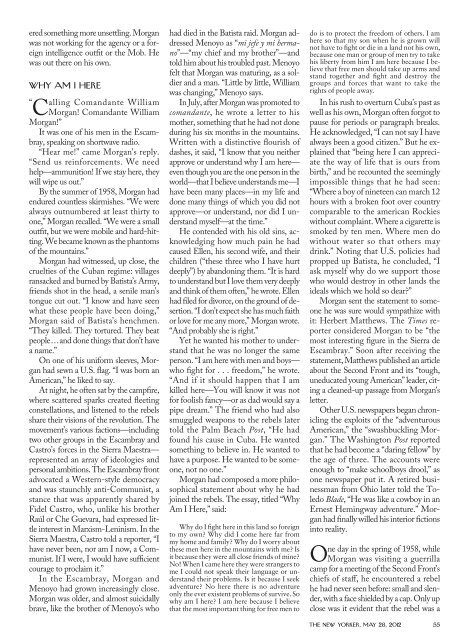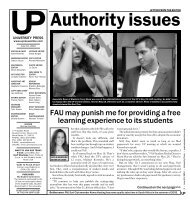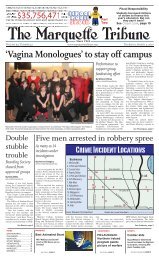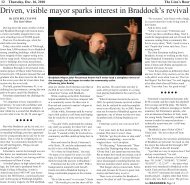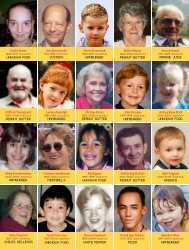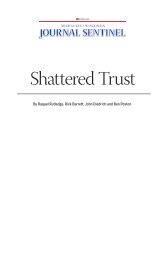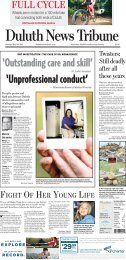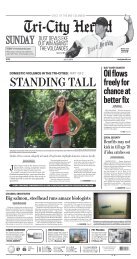THE YANKEE COMANDANTE
THE YANKEE COMANDANTE
THE YANKEE COMANDANTE
Create successful ePaper yourself
Turn your PDF publications into a flip-book with our unique Google optimized e-Paper software.
ered something more unsettling. Morgan<br />
was not working for the agency or a foreign<br />
intelligence outfit or the Mob. He<br />
was out there on his own.<br />
“C<br />
WHY AM I HERE<br />
alling Comandante William<br />
Morgan! Comandante William<br />
Morgan!”<br />
It was one of his men in the Escambray,<br />
speaking on shortwave radio.<br />
“Hear me!” came Morgan’s reply.<br />
“Send us reinforcements. We need<br />
help—ammunition! If we stay here, they<br />
will wipe us out.”<br />
By the summer of 1958, Morgan had<br />
endured countless skirmishes. “We were<br />
always outnumbered at least thirty to<br />
one,” Morgan recalled. “We were a small<br />
outfit, but we were mobile and hard-hitting.<br />
We became known as the phantoms<br />
of the mountains.”<br />
Morgan had witnessed, up close, the<br />
cruelties of the Cuban regime: villages<br />
ransacked and burned by Batista’s Army,<br />
friends shot in the head, a senile man’s<br />
tongue cut out. “I know and have seen<br />
what these people have been doing,”<br />
Morgan said of Batista’s henchmen.<br />
“They killed. They tortured. They beat<br />
people...and done things that don’t have<br />
a name.”<br />
On one of his uniform sleeves, Morgan<br />
had sewn a U.S. flag. “I was born an<br />
American,” he liked to say.<br />
At night, he often sat by the campfire,<br />
where scattered sparks created fleeting<br />
constellations, and listened to the rebels<br />
share their visions of the revolution. The<br />
movement’s various factions—including<br />
two other groups in the Escambray and<br />
Castro’s forces in the Sierra Maestra—<br />
represented an array of ideologies and<br />
personal ambitions. The Escambray front<br />
advocated a Western-style democracy<br />
and was staunchly anti-Communist, a<br />
stance that was apparently shared by<br />
Fidel Castro, who, unlike his brother<br />
Raúl or Che Guevara, had expressed little<br />
interest in Marxism-Leninism. In the<br />
Sierra Maestra, Castro told a reporter, “I<br />
have never been, nor am I now, a Communist.<br />
If I were, I would have sufficient<br />
courage to proclaim it.”<br />
In the Escambray, Morgan and<br />
Menoyo had grown increasingly close.<br />
Morgan was older, and almost suicidally<br />
brave, like the brother of Menoyo’s who<br />
had died in the Batista raid. Morgan addressed<br />
Menoyo as “mi jefe y mi hermano”—“my<br />
chief and my brother”—and<br />
told him about his troubled past. Menoyo<br />
felt that Morgan was maturing, as a soldier<br />
and a man. “Little by little, William<br />
was changing,” Menoyo says.<br />
In July, after Morgan was promoted to<br />
comandante, he wrote a letter to his<br />
mother, something that he had not done<br />
during his six months in the mountains.<br />
Written with a distinctive flourish of<br />
dashes, it said, “I know that you neither<br />
approve or understand why I am here—<br />
even though you are the one person in the<br />
world—that I believe understands me—I<br />
have been many places—in my life and<br />
done many things of which you did not<br />
approve—or understand, nor did I understand<br />
myself—at the time.”<br />
He contended with his old sins, acknowledging<br />
how much pain he had<br />
caused Ellen, his second wife, and their<br />
children (“these three who I have hurt<br />
deeply”) by abandoning them. “It is hard<br />
to understand but I love them very deeply<br />
and think of them often,” he wrote. Ellen<br />
had filed for divorce, on the ground of desertion.<br />
“I don’t expect she has much faith<br />
or love for me any more,” Morgan wrote.<br />
“And probably she is right.”<br />
Yet he wanted his mother to understand<br />
that he was no longer the same<br />
person. “I am here with men and boys—<br />
who fight for . . . freedom,” he wrote.<br />
“And if it should happen that I am<br />
killed here—You will know it was not<br />
for foolish fancy—or as dad would say a<br />
pipe dream.” The friend who had also<br />
smuggled weapons to the rebels later<br />
told the Palm Beach Post, “He had<br />
found his cause in Cuba. He wanted<br />
something to believe in. He wanted to<br />
have a purpose. He wanted to be someone,<br />
not no one.”<br />
Morgan had composed a more philosophical<br />
statement about why he had<br />
joined the rebels. The essay, titled “Why<br />
Am I Here,” said:<br />
Why do I fight here in this land so foreign<br />
to my own? Why did I come here far from<br />
my home and family? Why do I worry about<br />
these men here in the mountains with me? Is<br />
it because they were all close friends of mine?<br />
No! When I came here they were strangers to<br />
me I could not speak their language or understand<br />
their problems. Is it because I seek<br />
adventure? No here there is no adventure<br />
only the ever existent problems of survive. So<br />
why am I here? I am here because I believe<br />
that the most important thing for free men to<br />
do is to protect the freedom of others. I am<br />
here so that my son when he is grown will<br />
not have to fight or die in a land not his own,<br />
because one man or group of men try to take<br />
his liberty from him I am here because I believe<br />
that free men should take up arms and<br />
stand together and fight and destroy the<br />
groups and forces that want to take the<br />
rights of people away.<br />
In his rush to overturn Cuba’s past as<br />
well as his own, Morgan often forgot to<br />
pause for periods or paragraph breaks.<br />
He acknowledged, “I can not say I have<br />
always been a good citizen.” But he explained<br />
that “being here I can appreciate<br />
the way of life that is ours from<br />
birth,” and he recounted the seemingly<br />
impossible things that he had seen:<br />
“Where a boy of nineteen can march 12<br />
hours with a broken foot over country<br />
comparable to the american Rockies<br />
without complaint. Where a cigarette is<br />
smoked by ten men. Where men do<br />
without water so that others may<br />
drink.” Noting that U.S. policies had<br />
propped up Batista, he concluded, “I<br />
ask myself why do we support those<br />
who would destroy in other lands the<br />
ideals which we hold so dear?”<br />
Morgan sent the statement to someone<br />
he was sure would sympathize with<br />
it: Herbert Matthews. The Times reporter<br />
considered Morgan to be “the<br />
most interesting figure in the Sierra de<br />
Escambray.” Soon after receiving the<br />
statement, Matthews published an article<br />
about the Second Front and its “tough,<br />
uneducated young American” leader, citing<br />
a cleaned-up passage from Morgan’s<br />
letter.<br />
Other U.S. newspapers began chronicling<br />
the exploits of the “adventurous<br />
American,” the “swashbuckling Morgan.”<br />
The Washington Post reported<br />
that he had become a “daring fellow” by<br />
the age of three. The accounts were<br />
enough to “make schoolboys drool,” as<br />
one newspaper put it. A retired businessman<br />
from Ohio later told the Toledo<br />
Blade, “He was like a cowboy in an<br />
Ernest Hemingway adventure.” Morgan<br />
had finally willed his interior fictions<br />
into reality.<br />
One day in the spring of 1958, while<br />
Morgan was visiting a guerrilla<br />
camp for a meeting of the Second Front’s<br />
chiefs of staff, he encountered a rebel<br />
he had never seen before: small and slender,<br />
with a face shielded by a cap. Only up<br />
close was it evident that the rebel was a<br />
<strong>THE</strong> NEW YORKER, MAY 28, 2012 55


